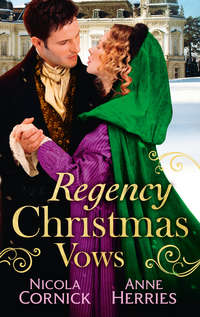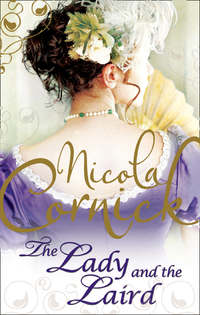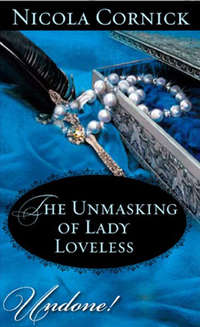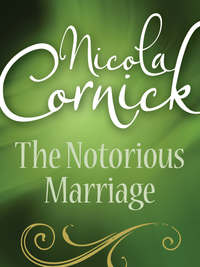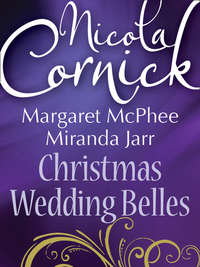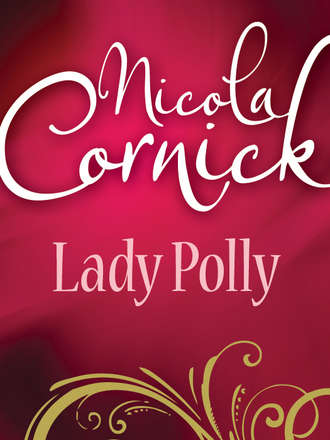
Полная версия
Lady Polly

Lord Henry made a slight, dismissive gesture
“What could a rake wish for from a lady on a providentially empty terrace?”
“Oh!”
Understanding came to Polly at the very last moment. She had once quite ached for Lord Henry to kiss her as long as it had been in a completely undemanding fashion. Some chaste but impassioned salutation had been the height of her aspirations.
This kiss might have been impassioned, but in no way could it be described as chaste. Lord Henry brought her into sudden, shocking contact with his body. His mouth captured hers with the ruthless skill of the expert, parting her lips so that her gasp was lost.
Lady Polly
Harlequin Historical
Harlequin Historicals is delighted to present author Nicola Cornick and her sparkling Regency
LADY POLLY
DON’T MISS THESE OTHER
TITLES AVAILABLE NOW:
#571 THE WIDOW’S LITTLE SECRET
Judith Stacy
#572 CELTIC BRIDE
Margo Maguire
#573 THE LAWMAN TAKES A WIFE
Anne Avery
Laddy Polly
Nicola Cornick

Nicola Cornick is passionate about many things: her country cottage and its garden, her two small cats, her husband and her writing, though not necessarily in that order! She has always been fascinated by history, both as her chosen subject at university and subsequently as an engrossing hobby. She works as university administrator and finds her writing the perfect antidote to the demands of life in a busy office.
Contents
Prologue
Chapter One
Chapter Two
Chapter Three
Chapter Four
Chapter Five
Chapter Six
Chapter Seven
Chapter Eight
Chapter Nine
Chapter Ten
Chapter Eleven
Chapter Twelve
Chapter Thirteen
Chapter Fourteen
Chapter Fifteen
Chapter Sixteen
Chapter Seventeen
Chapter Eighteen
Prologue
1812
“You’re a damned fool, Henry!” Simon Verey leant on the table and addressed his friend in tones that would have led Henry Marchnight to call him out under any other circumstances. “Leave it a few weeks—a month, even—for everyone to lose interest in Miss Jacques’s vicious rumours! If you go to Lady Paulersbury’s rout tonight, they’ll make mincemeat of you!”
Lord Henry’s only response was a rather lop-sided grin as he tilted his head to consider the intricate folds of his violet cravat in the mirror.
“The Napoleon,” he mused. “Rather a neat style, don’t you think, Simon? Languishing and romantic, as is appropriate for this evening! Do you think that it will bring me the luck of the French?”
“In love or in war?” Verey asked drily.
Lord Henry’s only reply was another smile. “I regret that I cannot take your advice, Simon,” he continued. “I must see Lady Polly Seagrave tonight. I am hoping that I may still persuade her to consent to be my wife.”
Verey’s lips tightened. He had seen that reckless look in his friend’s grey eyes before and knew it promised trouble. There was something both tense and watchful about Lord Henry’s elegantly clad form, some element held under the barest control. And Verey understood his desperation, but he thought Henry had miscalculated.
“They’ll never let you near her,” he prophesied grimly. “Good God, the whole Town thinks that you have tried to debauch Miss Jacques, then proposed marriage to Lady Polly for her fortune only a day later! You’ll be ripped to pieces, Henry!”
Lord Henry shrugged. “Lady Polly would never believe such a thing of me, Simon. I know she would have accepted my suit had the Earl not refused to countenance it!”
Verey shook his head. What madness could have possessed Lord Henry to ask the starchy old Earl of Seagrave for his daughter’s hand in marriage whilst such unsavoury, albeit untrue, rumours were being circulated? He must have known that the Earl was so high in the instep that he would never sanction a match between his only daughter and a man who had been branded a philanderer and deceiver.
With its usual appetite for scandal, Society had been quick to seize upon the accusations of Miss Sally Jacques that Henry Marchnight had promised her marriage and then attempted to seduce her. Verey knew that Miss Jacques was the daughter of a Cit who had attempted to establish herself amongst the ton and whose disappointment at being unable to bring Henry up to scratch had led to this ill-considered revenge. Verey also knew that most of Society thought Miss Jacques an ill-bred mushroom and that interest in the story would wane very swiftly. If only Henry had exercised his usual cool detachment! But in his very real passion for Lady Polly Seagrave he seemed uncharacteristically hasty, unable to wait even a few days for matters to cool. Simon was prepared to support his friend, but he was certain that the evening would be deeply unenjoyable.
Their reception at Lady Paulersbury’s was everything Verey had predicted and worse. Silence fell as Lord Henry Marchnight was announced. Men whom he had counted his friends pointedly turned their backs. Some women whispered maliciously behind their fans, whilst others drew aside from him with disgusted expressions. There was a moment when Lord Henry was certain Lord Paulersbury was about to have him horsewhipped from the house before his wife’s more temperate counsel prevailed. But he was treated as a social pariah, ignored or ridiculed, and it was a profoundly unpleasant and uncomfortable experience.
Lady Polly Seagrave saw Lord Henry’s tall figure across the ballroom and was immediately certain that he had come to seek her out. She caught her breath. To have dared so much public opprobrium, just for the chance of speech with her! He must know that her father had forbidden them to meet and the entire Town was reviling him over the scandal of Miss Jacques.
Polly burned with outraged fury at the treatment Sally Jacques had meted out to Lord Henry. Sally and Polly had once been friends, before Miss Jacques’s jealousy at Lord Henry’s partiality for Polly had driven a wedge between them. Sally had contrived that her carriage had broken down in the vicinity of Lord Henry’s home at Ruthford and had imposed on his hospitality overnight so that she had compromised them both. In vain had Lord Henry argued that Miss Jacques’s companion and his own servants had provided ample chaperonage and that nothing untoward had occurred. Public opinion, carefully encouraged by Miss Jacques and her chaperon with their hints at false proposals and attempted seduction, was firmly of the belief that he should have made her an offer. His refusal to do so proved him to be no gentleman. It was not long before the true facts of the case had been turned inside out and Henry Marchnight was denounced as a scoundrel and seducer.
A few days before, when Polly had heard the harmful gossip repeated by two salacious matrons, she had burst out that it was all malicious lies. Immediately their watchful gaze had turned thoughtfully on her. Her mother had pulled Polly to one side.
“Be quiet, you silly girl!” Lady Seagrave had hissed in Polly’s ear. “You will have them thinking that Lord Henry has debauched you too!”
“Lord Henry has not debauched anyone!” Polly had muttered furiously, but she kept her voice discreetly low for all her vehemence. “He is an honourable man!”
For a moment Lady Seagrave had looked almost sorry for her daughter. “Lord Henry may be as honourable as you please, but no one will believe it now! And that is because they do not want to believe it, for the tale is so much more interesting than the truth. So you will be a good girl and have no more to do with him!”
For a moment Polly had looked mutinous. Lord Henry had always behaved as a perfect gentleman towards her. She was more than half in love with him. But she had already had her father explain, very clearly and kindly, just why he could not entertain Lord Henry’s suit. And Polly was only eighteen, and accustomed to obeying her parents unquestioningly in everything…
And now Lady Seagrave had caught her arm, turning her away so that Lord Henry’s curiously compelling grey gaze could no longer disturb her so.
“You must not acknowledge him,” she murmured, whilst keeping a spurious social smile fixed on her face for the benefit of those about them who were watching with a keen interest.
Polly knew her mother was only acting with the best of intentions. A young lady’s good name was so fragile and scandal so contaminating. She had seen how a reputation could become so tarnished that a girl would become quite unmarriageable. But she was torn by her burgeoning feelings for Lord Henry. She had never been in love before and he had wooed her throughout the Season, so gently, so carefully. His attentions had never overstepped the mark and when he smiled at her with all the warmth and tenderness that spoke more clearly than any words, Polly felt deliciously safe and cherished.
She reluctantly allowed her mother to shepherd her away, but could not resist a quick glance over her shoulder. Lord Henry was still watching her. Polly gave a pleasurable little shiver of excitement, but at the same time a frisson of nerves prompted her to hope that he would not make a scene or press his attentions on her. That would be deliciously romantic but rather difficult to handle. Polly was not at all sure that she could cope with impassioned protestations of love.
It was much later in the evening when Lord Henry finally managed to get Polly on her own. Throughout the ball, she had been aware of his presence, the deceptively casual way in which he was watching her all the time. But she was never left alone. Lady Seagrave, a very dragon of propriety where her only daughter was concerned, seemed to follow her everywhere until Polly told her with asperity that she was quite capable of visiting the ladies’ withdrawing room alone.
It was on her way back that Lord Henry seized his chance, materialising in the deserted corridor and drawing her into an empty room before Polly even had time to catch her breath. It was vastly exciting, but also rather frightening. There was something driven about Lord Henry that evening, Polly thought, something so resolute that it made her quail and find him almost a stranger. She was not accustomed to strong emotion. The Seagrave household was run with apparent harmony and the Earl would never have countenanced any vulgar display of feeling.
Polly knew very little about love; she loved her parents with a dutiful respect, and knew, far more scandalously, that her brothers had both at one time or another had in keeping certain ladies on whom they lavished their affections. That, Polly had once overheard her mother darkly telling another matron, had very little to do with love at all. And here was Lord Henry Marchnight, burning with another type of romantic passion. His intensity frightened her.
“Lord Henry!” Polly’s voice trembled a little. “You know my father has forbidden me to speak with you—”
He took both her hands in his, his intent grey gaze fixed on her face. “I know it! But I had to see you! You know that he has refused my suit, but we cannot let that make us part! Come away with me, my love! If you will trust yourself to me—”
But Polly had taken a hasty step back, freeing her hands from his grasp. She had paled visibly, her cheeks as white as the pristine foulard at her throat. “Run away with you? But—”
“You must know that I love you! Say you’ll marry me!”
For a moment Polly wavered. He was taking her by storm, so ardent, so impassioned that she was tempted. But her feelings were barely awakened and everything in her upbringing conspired against him. His very ardour alienated her. He knew, a moment before she recoiled, that she was going to refuse him.
“Oh, no, indeed I could not! My father…the scandal…only think—” Polly’s eyes were huge with the horror of it. She broke off at the expression on Lord Henry’s face, suddenly aware that she might have been a little precipitate. Those grey eyes, so warm and tender before, were now so stony and withdrawn that Polly bit her lip. It was like looking into the face of a complete stranger.
The tears came into her eyes. She had a sudden conviction that she had just carelessly thrown away something infinitely precious, without truly understanding exactly what it was. She put out a tentative hand, but Lord Henry was already turning away.
“Polly!” The awesome tones were those of Lady Seagrave, who stood in the shadows, furious fire kindling in her dark eyes. “Come here at once! I knew I could not trust you on your own! And as for you, sir—”
She turned on Lord Henry, but he was already leaving. He sketched an immaculately elegant bow, first to the Countess and then to Polly.
“You need have no fears for your daughter at my hands, ma’am,” he said, his tone one of frigid courtesy. “I give you my word that I shall never approach her again.” And he was gone, leaving Polly with the comfort of her familiar world and a totally unfamiliar feeling of desolation in her heart.
Chapter One
1817
Sir Godfrey Orbison did not understand women. Never having entered the bond of matrimony and being devoid of close female relatives to guide him, he was ill-equipped to deal with a goddaughter he considered to be both foolish and ungrateful.
“You refused him because you did not love him?” Sir Godfrey’s black brows beetled together and he glared fiercely at Lady Polly Seagrave, his tone incredulous. “What is that to the purpose, pray? A fine situation if one had to love one’s intended spouse! The material point is that he is heir to the Duke of Bellars, and as such must be a better prospect than life as a penniless spinster! Aye, and a spinster who is fast approaching her dotage!”
The Dowager Countess of Seagrave was fluttering her hands in distress, but Lady Polly allowed herself a small smile, her elusive dimples peeping for a moment. She knew her godfather’s ill temper would not last long for he was incapable of bearing a grudge and was so fond of her that she could get away with most things. Turning down her fifth suitor of the Season and the nineteenth eligible proposal of her life was, however, testing his indulgence to the full. And he was her trustee, along with her elder brother, and as such could cut up rough about her allowance if he chose. In eighteen months she would be twenty-five and should be mistress of her own fortune, but if Sir Godfrey chose to make her a penniless spinster, it was within his legal powers to do so. Clearly some tact and charm was called for.
She dropped a small curtsy and smiled at her godfather beguilingly. “Dearest Sir Godfrey, you have been like a father to me since my own papa died, and I do thank you for all your guidance and advice! But I am persuaded that you could not really wish me to marry John Bellars! He is a pleasant enough man, if as dull as ditchwater, but it is old Lady Bellars who would be the rub! Why, she has him completely under her thumb and is the most mean-spirited woman—”
“Humph!” Sir Godfrey opined.
“And she is penny-pinching, too!” The Dowager Countess of Seagrave put in, hastily improving on her daughter’s theme. “I hear she keeps young John on a tight rein, for all that she has no real control over his fortune! And,” she added artfully, with a flash of her dark eyes, “was it not Augusta Bellars who tried to snare you in your salad days, Godfrey? She pursued you quite violently, as I recall! They were taking bets in the clubs that she would catch you!”
Sir Godfrey’s choleric gaze kindled again. “Gussie Grantley! Yes, b’God, I’d forgotten that! Tiresome woman, forever wheedling herself into my company, telling everyone there was an understanding between us! Well…” he sighed heavily, “…can’t be doing with that connection in the family, then. Why, she might view this as a second chance to catch me!”
“It is not to be contemplated!” The Dowager declared, smiling as much with genuine amusement as relief. The thought of the widowed Duchess of Bellars pursuing the elderly Sir Godfrey afforded her much secret amusement. In her experience, men often had a much-inflated view of their own attractions.
Sir Godfrey’s gaze had fallen on Polly again, demurely sitting with her chin in her hand smiling at him. Fond of her as he was, he was obliged to view her as another example of an unsatisfactory female.
“All the same, Poll, this won’t do, you know! Nineteen suitors, all worthy men, and not one of them up to your expectations!” Sir Godfrey cleared his throat, intent on delivering a homily. “I thought that you would take Julian Morrish when he offered this Season—damned…harrumph! Dashed silly not to! No better man in the whole of London! And Seagrave took Morrish’s rejection that badly, I know…”
The Dowager Lady Seagrave cleared her throat delicately. She had been quick to see her daughter’s discomfort, for the colour had come rushing into Polly’s ivory complexion, making her look suddenly more animated and much prettier. That was how she used to look, Lady Seagrave thought with a sudden pang of regret, remembering a time five years before, when her daughter had been a bright and vivacious debutante rather than a cool and withdrawn young lady with a reputation for pride. The young Lady Polly had been an appealing girl, drawing quite a following to her with her lustrous cloud of dark hair and expressive brown eyes. She had not lacked for offers, but none of them seemed to meet her exacting standards. No man in five years had been able to persuade her of the merit of his suit.
As for Julian Morrish, that had indeed been an unfortunate affair and one which had caused ill feeling within the family for several weeks until Lucille, the Dowager’s daughter-in-law, had interceded with her husband to forgive Polly. Nick Seagrave had been furious that his close friend, Julian Morrish, had been rejected by his sister. Everyone knew Morrish to be a fine man and one to whom no possible objection could be made on the grounds of rank, consequence, fortune or reputation. Polly’s behaviour had put a great strain on the friendship between Seagrave and Morrish, and an even greater strain on relationships within the family. Polly’s other brother, Peter, had strolled into the breakfast-room one morning and remarked that he would rather face the French again at Waterloo than be the butt of his brother and sister’s ill humour.
“I think, perhaps, that it would be wise for Polly to retire for a little now, Sir Godfrey,” the Dowager Countess said hastily, seeing that her daughter’s colour was still high. “We go to Lady Phillips’s ridotto tonight, and you know how Polly tires easily these days! Polly, my love—”
In response to her mother’s meaningful nod, Polly got up, pressed a kiss on Sir Godfrey’s whiskery face, and slipped out of the room. Her spirits had taken a tumble. The mention of Julian Morrish had been an unfortunate one.
Once out in the deserted entrance hall, Polly leaned against a marble pillar and rested one hot cheek against its coolness. She had known that Sir Godfrey would be angry at Bellars’s dismissal, especially as it followed on so swiftly from the fiasco of Julian Morrish. And she had been as upset as anyone at the necessity of rejecting Morrish, knowing it would cause difficulties for Nicholas Seagrave in particular. Yet, she could not have accepted Morrish, not whilst the spectre of Lord Henry Marchnight persisted in imposing itself between her and every eligible man she met. A tear slid from the corner of one of Polly’s closed eyes and she swallowed what seemed to be a huge lump in her throat.
Immediately after her estrangement from Lord Henry five years previously, Polly had been in very low spirits. She had berated herself fiercely for the lack of courage and the lack of faith that had led her to refuse to elope with Lord Henry. She had a curious feeling of loss, as though she had thrown away something priceless, something that would never be recaptured. The expression on Lord Henry’s face as he had left her that night, the stony withdrawal, the contempt for her weakness, had haunted her for a long time. It was only later, when she was older and understood her loss all the more, that she realised that his love for her had been far more mature than the girlish passion she had thought that she had felt for him. She had simply not been ready to accept the full responsibility of his love and all its implications, not ready to defy her family and run away with him.
The most acute elements of her misery wore off with time, particularly as Lord Henry was absent from Town much of the time and his path and Polly’s did not cross much for several years. Whenever she heard news of him it would invariably involve some highly coloured account of his amatory adventures, for he appeared to have become a thorough-going rake and wastrel. Polly’s heart ached when she heard the tales, as though some part of her could not relinquish Henry for good. And then, the previous summer, her dormant feelings had been stirred into life again.
Lord Henry had been in Suffolk that summer, at the same time that Polly was at Dillingham with her mother and brothers, and it was inevitable that they should be in each other’s company. Each tried to avoid the other as much as possible, their meetings made awkward by the history that lay between them. To Polly’s horror, she had discovered that her childish infatuation had somehow transformed itself over the years into a frighteningly strong attachment. She realised that Lord Henry had unconsciously influenced her refusal of every offer of marriage over the past five years, and that since she was unable to marry him now, she would marry no one.
The realisation made her even more self-conscious in his company and she cursed her inability to match Henry’s smooth detachment. Her original refusal to elope with him was now an awesome barrier between them, making the re-establishment of cordial or at the least civil relations between them well-nigh impossible. When Lord Henry had said, that fateful night, that he would never approach Polly again, he had meant just that. They were obliged to exchange a few words when they met in public, but he seldom sought her out. Then, of course, there was his reputation as a rake, which made every chaperon blench. Although many of his escapades were probably exaggerated, there was no doubt that he had become very wild and would not be considered a suitable escort for any unmarried lady. And now, there was an even more potent and unexpected reason why she could never hope to re-attach his affections…
The sound of voices at the main door stirred Polly from her thoughts. She straightened up to see her sister-in-law Lucille taking her leave of a couple on the doorstep and hurrying into the hall, pulling off her gloves. As Lucille’s eyes adjusted to the sudden shade, Polly came forward to greet her.
“Oh, Lucille, I am glad to see you back!” Then, as her sister-in-law fixed her with a rather too perceptive gaze, she said hastily, “Who were those people? They looked a little eccentric!”
Lucille laughed. “The lady was a Mrs Golightly, who is a friend of Miss Hannah More, and was telling me all about her work with the Bettering Society! They work to improve the condition of the poor, you know! And the gentleman is a poet, Mr Cleymore, who is accounted quite good, I believe, although I cannot understand his work! They are complete originals, but not people of fashion!”
“Who cares a button for that?” Polly said stoutly. One of the things she particularly liked about Lucille was her lack of interest in worldly concerns. She would befriend people because she liked them, support causes because she believed in them, and gently rebuke even the most high-ranking Dowager who ventured to criticise her for her quaint interests. Lucille had grown in poise and confidence since her marriage to Nicholas Seagrave, Polly thought now, but she retained the innocent interest she had in everyone and everything. It was a quality that added to her novelty value in the eyes of the ton, who were always seeking fresh amusement. Lucille, with her slightly eccentric ways, had been a gift to such jaded palates. And the final titillation, of course, was the dreadful, brassy Cyprian who was Lucille’s twin and had done her utmost to embarrass her sister, seeking her out at public events and trying to hang on her coattails. Lucille had dealt with all the pitfalls most admirably, Polly thought with a smile, taking her sister-in-law’s arm and steering her towards the green drawing-room and away from Sir Godfrey and the Dowager Countess.


